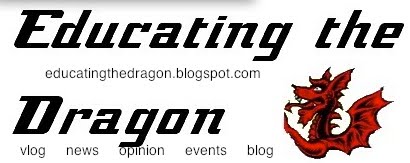It’s been almost 10 years since Mark Prensky, based on his own observations, first used the term ‘digital natives’ to describe the current generation of students who:
"have spent their entire lives surrounded by and using computers, videogames, digital music players, video cams, cell phones, and all the other toys and tools of the digital age” (Prensky, 2001, p.1).
Prensky argues that the digital natives’ dependence on technology tools influences the way they learn and the way they should be taught.
However, although most students use technology frequently in their everyday lives, if we look at current research or if we observe our own students, we often see that they are not always able to transfer their skills into the classroom and use ICT educationally.
Two years ago, a large scale study from the University of Nottingham in the UK (Luckin et al., 2009) looked into secondary school students' perceptions and every day use of Web2.0 tools. Through their findings from surveys and focus group interviews, the researchers confirmed that students have high levels of access to Web2.0 tools. Based on the data, the students were categorized under three groups: a) researchers, b) collaborators, c) producers and publishers. Most students were under the first group, as they mostly used technology to retrieve information. Few students were identified as collaborators or creators and publishers, pointing out the areas where students need more guidance and support from their teachers.
 Though unsophisticated, we can see that most students’ experience with technology tools makes them more positive towards ICT implementation at school. However students’ perspectives on their e-learning experiences in the classroom often question school’s ability to engage them in meaningful and authentic learning with ICT. “Do you know us?” and “Engage us” are among the basic themes that researchers found when investigating 4,000 middle grade students in North Carolina and their perspectives on school, technologies and academic engagement (Spires et al., 2008).
Though unsophisticated, we can see that most students’ experience with technology tools makes them more positive towards ICT implementation at school. However students’ perspectives on their e-learning experiences in the classroom often question school’s ability to engage them in meaningful and authentic learning with ICT. “Do you know us?” and “Engage us” are among the basic themes that researchers found when investigating 4,000 middle grade students in North Carolina and their perspectives on school, technologies and academic engagement (Spires et al., 2008).
Yes, our students are often more familiar with ICT use in their everyday life, but we need to remember that not all of them are and, even if they do, they often lack the skills that will enable them to use ICT effectively for their learning. A student quote that struck me from the first moment I read it was in Sara Kajder’s (2007) article about the potential of ICT to enhance student learning.
Max, a high school student shared during an interview:
"My teachers don't have to know where to click. I can teach them that. I just want them to teach me the parts that I am not thinking about yet".
Looking into the New Zealand context, in her literature review on e-learning, Noeline Wright (2010) argues that, despite many students’ familiarity with ICT use, young learners still need more guidance in using technology in meaningful and educational focused ways. What is our role as educators in this context?
The rollout of ultra fast broadband in New Zealand is expected to increase student and school access to ICT. Therefore listening to student voice becomes more than necessary, so that we can improve our practices and address today’s learners’ real needs.
“If we make student perspectives a regular part of the educational dialogue and action agenda, we may create a proactive stance to student academic engagement and achievement needs and subsequently contribute to a more responsive and innovative schooling process” (Spires et al., 2008, p.513).
Resources:
photo by delphwynd
Kajder, S., B. (2007). Unleashing potential with emerging technologies. In K. Beers, R., E., Probst & L., Rief (Eds.), Adolescent literacy: Turning promise into practice (pp.213-229). Portsmouth, NH: Heinemann.
Luckin, R., Clark, W., Graber, R., Logan, K., Mee, A. & Oliver, M. (2009). Do Web 2.0 tools really open the door to learning? Practices, perceptions and profiles of 11-16-year-old students, Learning Media and Technology, 34(2), 87-104.
Prensky, M. (2001). Digital natives, digital immigrants, On the Horizon, 9(5), 1-6.
Prensky, M. (2001). Digital natives – digital immigrants: Review by Nathan Walsh
Spires, H., A., Lee, J., K. & Turner, K., A. (2008). Having your say: Middle grade student perspectives on school, technologies and academic engagement, Journal of Research on Technology in Education, 40(4), 497-515.
Wright, N. (2010). E-learning and implications for New Zealand schools: a literature review.

